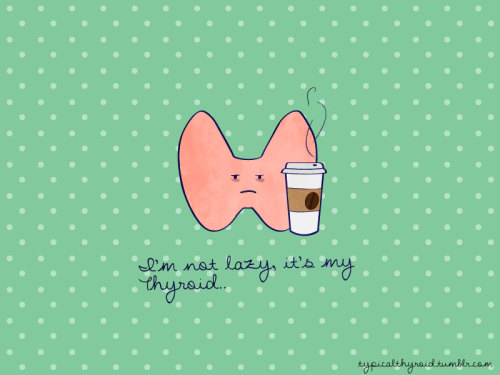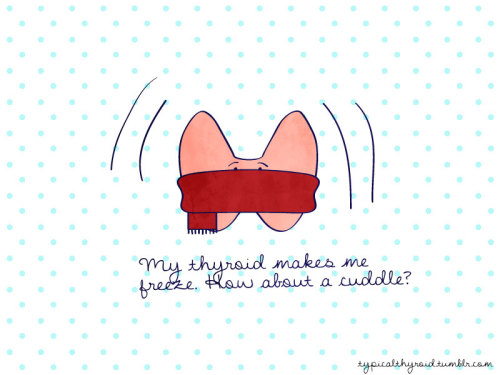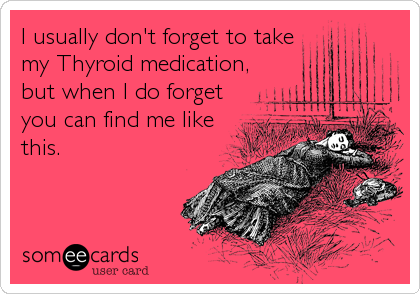Okay so I've spoken before a few times on here about mental health and my own experiences with it. But mental illness is not the only type of illness that you cannot physically see. This week (26th September - 2nd October) is Invisible Illness Awareness week and so I thought we could talk about it.
Now I'm no health specialist or doctor, but I do have a lot to say in this area. I live with invisible illness and I haven't mentioned it on here or really anywhere online because I don't think that it is necessarily relevant most of the time. However, I'm not ashamed or embarrassed to talk about it. I can't speak for all chronic illnesses, of course, but I can share my own story and hopefully spread some knowledge.
This article on The Mighty has some great examples of how it can feel to have an invisible illness.
Today I'm going to focus on an invisible illness called Hypothyroidism, what it is, causes, symptoms and treatment. *I have been diagnosed with PCOS, but I'm still coming to terms with this myself so I won't be talking about it on here for now.*
 |
| thestar.com |
What is Hypothyroidism?
I have a condition called hypothyroidism, also known as an underactive thyroid. It means that my thyroid gland (it's in your neck and looks a bit like a butterfly) doesn't function properly and the normal amount of hormones that it's supposed to make in order for my body to work properly aren't being made. Until I was diagnosed in 2013 I had no idea what a thyroid even was. When I was told it produced hormones I assumed that meant I had a fertility issue (which it can be, but we'll get to that later) and I didn't even realise that there were other types of hormones.
Causes
There are a few things that can cause an underactive thyroid, such as over treated hyperthyroid (over active where there are too many hormones), goiter, thyroidectomy, radiation therapy or hashimotos disease. However, a lot of the time hypothyroidism can just develop on its own and that is the situation in my own case. It's most common in middle aged women, but can develop in any gender or age group.
 |
| typicalthyroid.tumblr.com |
Symptoms
Not every person will experience all of these and there are many more, but these are the most common:
- Weight gain
- Fatigue/exhaustion
- Sensitivity to the cold
- Dry skin
- Puffy face
- Brittle nails and hair
- Constipation
- Muscle weakness and pain
- Irregular or heavy periods
- Brain fog (problems concentrating or remembering)
- Low mood
If untreated for a long time hypothyroidism can also contribute to other health problems as well. These include depression, carpel tunnel syndrome and fertility issues.
Treatment
Now all this sounds rubbish right? And it really can be. There's no real cure, but there is medication that is typically taken daily and the dosage depends on the individuals needs. I currently take 100micrograms of levothyroxine which is a synthetic version of a thyroid hormone and I will have to take this every day for the rest of my life.
A common misconception is that a person is automatically better because they are taking medication. It can be very hard to find the correct dosage and it's something that can take years depending on the individual and their doctor. There also are very limited options here in the UK, sort of a one-pill-for-all, unless you are able to afford private care. I personally notice a huge difference when I miss a pill, however the pills still don't make me feel completely normal as I used to be and I can have good and bad days.
It's mainly a lack of energy that affects me the most I know that I need a check on my thyroid when I find myself napping a lot. I can't even explain how it feels to be that tired, but imagine not having enough energy to cook or shower or pop out to the shop. I often get brainfog which makes it hard for me to read or do my uni work and muscle aches which just makes me want to stay in bed. I do feel the cold a lot, but that is manageable by layering up. I have to know my limits with my energy because I'm still tired most days and if I do over do it I will be wiped out for a couple of days. The thyroid affects so many things in the body and one of them is the immune system so I'm more likely to get colds and infections which is irritating (I have had conjunctivitis for a month and it's still not gone!). My metabolism is also affected which makes losing weight and keeping it off especially difficult and my hair can become very thin sometimes.
 |
| typicalthyroid.tumblr.com |
Looking at me you wouldn't know there was anything wrong. People with invisible illness don't want special treatment, that's not the point here, but you should never make assumptions about somebody's health and always be mindful that you can't always see what somebody is going through.
I hope this was informative, I thought that I definitely should be raising some kind of awareness to invisible illness and the best way I thought to was to talk about my own illness and how it affects me.
For more information on hypothyroidism or other thyroid conditions check out the British Thyroid Foundation website.
For more information on hypothyroidism or other thyroid conditions check out the British Thyroid Foundation website.
Bicks x

No comments:
Post a Comment